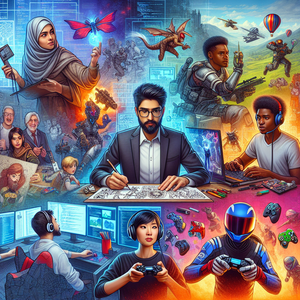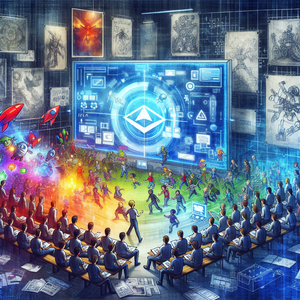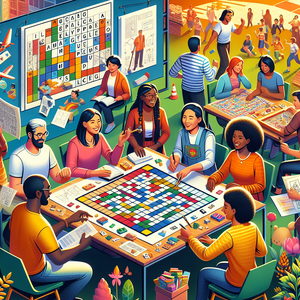
15 Exciting Careers in the Video Game Industry: A Dive into Roles, Responsibilities, and Requirements
The video game industry is not only a creative powerhouse but also a rapidly expanding field that offers a multitude of career paths for individuals with diverse skills and interests. With the advent of new technologies and the growing prominence of esports, the demand for talented professionals has never been higher. Whether you are drawn to the artistic side, possess technical expertise, or thrive in community engagement, there are numerous opportunities waiting for you in this dynamic sector. Recent trends highlight not just traditional roles in game development but also burgeoning fields like AI engineering and community management, reflecting the industry's evolving landscape. Here’s a closer look at 15 intriguing job roles within the video game industry, outlining their responsibilities, required skills, and current job market trends.
Job Summaries:
Game Designer:
- As the architects of gameplay, game designers conceptualize mechanics, narratives, and character development.
- Collaborating with artists, programmers, and writers, they create immersive worlds that captivate players.
- A degree in game design or a related field is often beneficial, alongside proficiency in design tools like Unity or Unreal Engine.
- With the increasing complexity of modern games, innovative designers are in high demand, paving the way for unique gaming experiences.
Video Game Programmer:
- Video game programmers transform creative ideas into playable realities through coding.
- Their work encompasses writing the underlying code that shapes gameplay mechanics and graphics.
- Typically requiring a bachelor’s degree in computer science, programmers must excel in languages such as C++, C#, and Python.
- With the rise of intricate gaming systems, skilled programmers capable of optimizing performance are becoming indispensable.
Game Animator:
- Game animators infuse life into characters and settings through animation techniques.
- Utilizing both 2D and 3D software, they craft movements that resonate with players.
- A background in animation or fine arts is often essential, paired with a strong portfolio showcasing their work.
- As visual storytelling gains importance in gaming, the need for talented animators is on the rise.
Quality Assurance (QA) Tester:
- QA testers are essential for delivering seamless player experiences.
- They rigorously test games to identify bugs and ensure functionality across platforms.
- While formal education may not be mandatory, a foundational understanding of game design principles is advantageous.
- As games grow in complexity, the critical role of QA testers becomes ever more significant.
Game Producer:
- Game producers manage the intricate process of game development.
- Overseeing timelines, budgets, and team collaboration.
- Acting as liaisons between departments.
- Ensuring that the creative vision is realized efficiently.
- A degree in project management is often preferred, along with industry experience.
- Proficient producers are vital for successful launches as projects expand in scale.
Game Writer:
- Crafting compelling narratives is the hallmark of game writers.
- Game writers develop dialogue, character arcs, and engaging storylines.
- Strong writing skills and an understanding of interactive storytelling are essential.
- Typically requiring a degree in English or creative writing.
- With players increasingly seeking rich narratives, the demand for skilled game writers is growing.
Sound Designer:
- Sound designers create the auditory landscape of video games, including sound effects and music.
- Often possessing a degree in audio engineering or music production.
- They must be adept with audio editing software.
- The importance of sound in enhancing gameplay experiences has led to a rising demand for creative sound designers.
Marketing Executive:
- In a competitive gaming market, marketing executives develop and execute strategies to promote games effectively.
- Conducting market research and crafting brand messaging that resonates with players are key responsibilities.
- A background in marketing or communications is typically required, alongside strong analytical skills.
Community Manager:
- Community managers play a crucial role in connecting developers with players.
- They foster engagement and manage feedback through various platforms.
- Excellent communication skills are essential for success.
- A deep understanding of gaming culture is essential for success.
- The demand for adept community managers is increasing as gaming communities continue to grow.
Esports Manager:
- With the rise of competitive gaming, esports managers oversee teams and events, navigating sponsorships and organizational logistics.
- A degree in sports management or business is often preferred.
- As the esports sector continues to flourish, skilled managers are vital for promoting teams and facilitating effective communication.
Game Marketing Specialist:
- Game marketing specialists tailor marketing strategies specifically for gaming audiences.
- They analyze market trends and collaborate with influencers to create impactful promotional content.
- A background in marketing or communications is generally required, as understanding gamer behavior is crucial for successful campaigns.
Technical Artist:
- Technical artists bridge the gap between art and programming, ensuring that visual elements perform optimally.
- Typically requiring a degree in art or computer science, they must be proficient in tools like Maya and Unity.
- As the demand for high-fidelity graphics grows, technical artists are becoming increasingly integral to the gaming process.
Game Localization Specialist:
- Game localization specialists adapt games for various international markets.
- Translating content while ensuring cultural relevance.
- Proficiency in multiple languages and knowledge of localization practices are essential.
- Often requiring a degree in translation or linguistics.
- As the gaming industry expands globally, these specialists are critical in ensuring a game's success in diverse markets.
UI/UX Designer:
- UI/UX designers enhance player experiences through intuitive interface design.
- They conduct user research and develop wireframes, collaborating closely with developers.
- A degree in design or a related field is typically necessary.
- As player satisfaction becomes paramount, the demand for skilled UI/UX designers continues to grow.
Mobile Game Producer:
- Mobile game producers oversee the development of games for smartphones and tablets.
- They manage project timelines and team coordination.
- A background in project management or game development is preferred.
- Experience in the mobile gaming market is important.
- As mobile gaming continues to expand, these producers play a vital role in delivering engaging experiences for players on the go.
The video game industry is teeming with career opportunities that span a wide range of talents, from creative design to technical development and community engagement. As this vibrant sector evolves, staying abreast of emerging trends and skills will enhance your career prospects. Whether you are just beginning your journey or considering a shift in your career path, these 15 roles provide a glimpse into the vast array of possibilities within the gaming world. With the right skills and passion, you can unlock a fulfilling career in this thrilling industry.
Explore More Jobs
